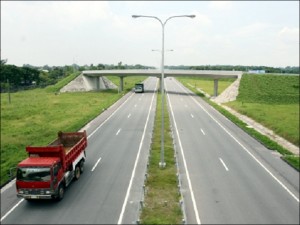Privatization of SCTEx hits a snag

PRIVATIZATION SNAG The Bases Conversion and Development Authority has reportedly made changes in the original contract signed with the MNTC, which won the bid to manage and operate the three-year-old Subic-Clark-Tarlac Expressway (SCTex). MNTC chairman Manuel V. Pangilinan says they have the option to “walk away from the project” because of this issue. INQUIRER PHOTO/NIÑO JESUS ORBETA
HONG KONG—The privatization of the Subic-Clark-Tarlac Expressway (SCTEx) has been put on hold due to a “midnight” decision by the Bases Conversion and Development Authority to introduce changes in the contract.
Manila North Tollways Corp. (MNTC), chaired by business executive Manuel V. Pangilinan, last November won the 25-year contract to operate and manage the 94-kilometer highway.
But Pangilinan expressed dismay at the BCDA’s last-minute changes to the contract’s financial terms—a sign of indecisiveness that put in question the integrity of the government’s public-private partnership (PPP) infrastructure program.
“We already signed the concession agreement with the BCDA last November. This was approved by the Toll Regulatory Board and the Office of the Government Corporate Counsel,” Pangilinan said.
“But just before they retired, the previous management of the BCDA raised last-minute issues,” he told Manila-based reporters.
Article continues after this advertisementPangilinan said former BCDA chairman Aloysius Santos, an appointee of then President Arroyo, demanded changes in the concession contract’s financial terms.
Article continues after this advertisementUnder the original deal, MNTC would pay semi-annual concession fees in the first five years that the government would use to pay off loans taken out to build the road. For the remainder of the contract, the BCDA would have a 20-percent share in all revenues from the road.
Pangilinan said MNTC was now in talks with the current BCDA management, headed by new chairman Felicito Payumo, on how to resolve the issues raised by the agency’s outgoing leadership.
For MNTC, Pangilinan said the provisions of the original deal should be retained.
“We’re leaving it to the BCDA, but we think contracts with private companies should be sacred, especially if the fulcrum of the government’s economic program is the PPP program,” he said. “The government has to honor its contract.”
Pangilinan said the company has considered just walking away from the project as a result of the issues.
“But we consider ourselves as the ‘cow-bell’ investor for the country,” he said, noting that the group’s interest in many government projects gave other investors the confidence to make bets on the Philippines.
“If we decided to get out, the administration’s PPP program will not look good to the international community,” he pointed out.